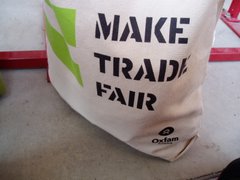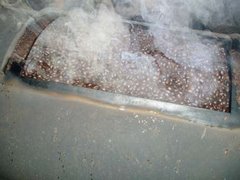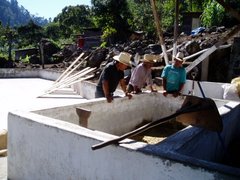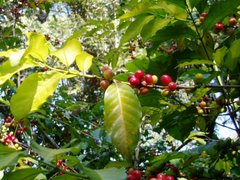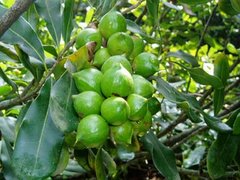I just heard about this new fair trade documentary recently about one person's journey of awareness (in more ways than one) with the trade justice movement.
From the website: "The Fair Trade movie is an innovative documentary film by Burning Heart Productions director Lauralee Farrer recounting the story of successful fair trade entrepreneur Tamara Johnston. Johnston, devastated by the tragic death of her fiancé, makes a bargain with God to postpone suicide in exchange for a meaningful life. She quits her job at Dreamworks, her twin sister Shelby quits her job teaching art history at California State University at Los Angeles, and brother-in-law Steven quits his job at JPL in order to spend their days making soap for their start up fair trade skincare company Anti-Body. Johnston becomes an activist for human rights and social justice causes, but despair over her loss remains unabated for several years. As she nears the deadline of her bargain, a trip to Kenya for Heifer International allows her to visit the fair trade co-op in Togo, Africa, from which Anti-Body buys its organic shea butter. There, she finds a surprising answer to what is required of her in exchange for a sustainable life."
Other recent films on fair trade:
Black Gold
The Price of Sugar
Good educational resource on fair trade:
Coffee, Corn and the Cost of Globalization by the Mennonite Central Committee
Saturday, July 26, 2008
Run the Chicago Marathon and support fair trade
Join the Chicago Fair Trade marathon team and run on behalf of farmers and artisans overseas.
Chicago Fair Trade is one of many charities participating in the Chicago marathon's official charity program.
Please NOTE: At this stage, runners must already be registered to participate in the marathon; if you know anyone running the marathon who is not yet participating in the charity program... please spread the word!!! The Chicago marathon is October 10.
Run the marathon with Chicago Fair Trade (CFT) and support the following development projects in Uganda and Guatemala through CFT's Faces of Fair Trade iniative:
Mirembe Kawomera (Delicious Peace) Coffee Cooperative, Uganda:
Funds raised through the marathon will support the improvement and expansion of the cooperative's small school. Mirembe Kawomera is an interfaith coffee cooperative in Uganda with Muslim, Jewish, Protestant and Catholic Christian members.
MayaWorks Literacy Program: http://www.mayaworks.org/
MayaWorks supports women and men striving to improve their lives despite obstacles such as grinding poverty and illiteracy. MayaWorks groups are organized in many Guatemalan villages because of the considerable strengths of Mayan women, their traditional weaving capabilities, their desire to learn modern business practices, and their determination to benefit their families and communities. Mayaworks pursues global partnerships with these communities through the promotion and purchase of colorful, attractive, affordable products of the Mayan artisans.
Fair Trade offers the possibility for building stable communities through sustainable development. It’s about breaking the cycle of poverty!
Are you registered for the 2008 Bank of America Chicago Marathon October 10th??? ( Marathon registration is closed now but still time to join our team.) Whether you are a first time marathoner or have experience, Chicago Fair Trade offers a training program through its partnership with CARA that will help you meet your goals!
Chicago Fair Trade participants raise money to benefit both producers in other countries and local educational work. In exchange for their fundraising efforts.
Participants commit to a Fundraising minimum: $750
Team members each commit to raising funds to support CFT's work to educate and promote fair trade as well as supporting global producers. In addition to making a difference in reducing global poverty, runners will receive:
Membership in Chicago Fair Trade!
Chicago Area Runner's Association! (CARA) marathon training program:
Super Clinic with expert speakers geared toward your level of marathon experience
17 weekend group training runs at a variety of paces and locations
Reduced entry to CARA’s Ready to Run 20 Miler on September 21st
Mid-week group runs to keep your running on track
Free weekly speed workouts for participants who are experienced marathoners
A special discount to all participants in CARA’s 2008 Spring Half Marathon Training
Great Nike tech shirts for the first 3,000 participants
A subscription to Running Times magazine to motivate you
24-hour injury prevention hotline provided by NovaCare Rehabilitation Center
Marathon: The Ultimate Training Guide by Hal Higdon for first time participants
Participant Information Guide with training schedules, times, dates, locations, contacts and other details.
Discounted admission to the 27th Mile Party on October 17th
Exclusive access to CARA tent on Race Day which includes gear check, port-o-potties, massage therapy, food, water, Gatorade, Goose Island beer!
Weekly e-mail messages with tips on training
Pre race party at the Funky Buddha lounge.
The satisfaction that you are helping to reduce global poverty!
TAKE THESE STEPS
Register for our team: Fill out the registration form and send to fairtraderunner@gmail.com
Questions? email or call 312-212-1760.
Fill out the registration form online.
Chicago Fair Trade is one of many charities participating in the Chicago marathon's official charity program.
Please NOTE: At this stage, runners must already be registered to participate in the marathon; if you know anyone running the marathon who is not yet participating in the charity program... please spread the word!!! The Chicago marathon is October 10.
Run the marathon with Chicago Fair Trade (CFT) and support the following development projects in Uganda and Guatemala through CFT's Faces of Fair Trade iniative:
Mirembe Kawomera (Delicious Peace) Coffee Cooperative, Uganda:
Funds raised through the marathon will support the improvement and expansion of the cooperative's small school. Mirembe Kawomera is an interfaith coffee cooperative in Uganda with Muslim, Jewish, Protestant and Catholic Christian members.
MayaWorks Literacy Program: http://www.mayaworks.org/
MayaWorks supports women and men striving to improve their lives despite obstacles such as grinding poverty and illiteracy. MayaWorks groups are organized in many Guatemalan villages because of the considerable strengths of Mayan women, their traditional weaving capabilities, their desire to learn modern business practices, and their determination to benefit their families and communities. Mayaworks pursues global partnerships with these communities through the promotion and purchase of colorful, attractive, affordable products of the Mayan artisans.
Fair Trade offers the possibility for building stable communities through sustainable development. It’s about breaking the cycle of poverty!
Are you registered for the 2008 Bank of America Chicago Marathon October 10th??? ( Marathon registration is closed now but still time to join our team.) Whether you are a first time marathoner or have experience, Chicago Fair Trade offers a training program through its partnership with CARA that will help you meet your goals!
Chicago Fair Trade participants raise money to benefit both producers in other countries and local educational work. In exchange for their fundraising efforts.
Participants commit to a Fundraising minimum: $750
Team members each commit to raising funds to support CFT's work to educate and promote fair trade as well as supporting global producers. In addition to making a difference in reducing global poverty, runners will receive:
Membership in Chicago Fair Trade!
Chicago Area Runner's Association! (CARA) marathon training program:
Super Clinic with expert speakers geared toward your level of marathon experience
17 weekend group training runs at a variety of paces and locations
Reduced entry to CARA’s Ready to Run 20 Miler on September 21st
Mid-week group runs to keep your running on track
Free weekly speed workouts for participants who are experienced marathoners
A special discount to all participants in CARA’s 2008 Spring Half Marathon Training
Great Nike tech shirts for the first 3,000 participants
A subscription to Running Times magazine to motivate you
24-hour injury prevention hotline provided by NovaCare Rehabilitation Center
Marathon: The Ultimate Training Guide by Hal Higdon for first time participants
Participant Information Guide with training schedules, times, dates, locations, contacts and other details.
Discounted admission to the 27th Mile Party on October 17th
Exclusive access to CARA tent on Race Day which includes gear check, port-o-potties, massage therapy, food, water, Gatorade, Goose Island beer!
Weekly e-mail messages with tips on training
Pre race party at the Funky Buddha lounge.
The satisfaction that you are helping to reduce global poverty!
TAKE THESE STEPS
Register for our team: Fill out the registration form and send to fairtraderunner@gmail.com
Questions? email or call 312-212-1760.
Fill out the registration form online.
Tuesday, July 8, 2008
Chicago Sun-Times Comments on Fair Trade
With fair trade, we all come out winners
Chicago Sun-Times Commentary July 7, 2008
You've probably seen the fair-trade labels on products like coffee, tea, chocolate, and on some clothes and crafts.
Now a campaign is under way to make all Chicago a fair-trade city. Organizers with Chicago Fair Trade are calling on the City Council to pass a resolution in support of fair trade and to encourage city departments to buy fair-trade goods.
A handful of exclusively fair-trade stores, about 30 Web-based fair-trade businesses and many other shops and restaurants serve or sell fair-trade products in the Chicago area. But the goal is to encourage the establishment of at least one fair-trade store in each of the city's 76 neighborhoods or, ideally, one per 10,000 residents.
It's a noble idea to support products that are made with minimal harm to the environment, knowing that the workers who picked the coffee beans or the cotton were paid a fair and living wage. More than 200 European cities, including London, and a few in the United States support the fair-trade movement. This includes passing resolutions, local governments purchasing fair-trade products and promoting the growth of fair-trade businesses.
But fair trade should also be about the United States practicing fair-trade policies. The bulk of the government's agricultural subsidies are given for five major crops in the United States -- corn, rice, soybeans, wheat and cotton. The subsidies are allotted on a per-acreage basis that primarily benefits large agribusiness and result in overproduction. The surplus is dumped at cut-rate prices on the world market.
The harm done to farmers in the developing world is staggering.
Consider cotton farmers in West Africa: From 2001 and 2005, they lost $382 million in exports because of America's self-serving agricultural policies -- policies that don't even benefit most small American farmers. Three-quarters of American farmers receive no subsidies because they are not growing these particular crops.
Eliminating U.S. cotton subsidies would increase income for some 10 million Africans by 2.3 percent to 5.7 percent, according to Oxfam. This would dramatically improve the lives of African farmers, who subsist on less than $2 a day. If poor countries could increase their share of exports by just 1 percent, Oxfam projects, some 128 million people would be lifted out of poverty.
The United States already gives Africa billions of dollars in the form of food and medical aid, but adopting strong fair-trade policies would help grow Africa's local economies. It's the old maxim: Give a person a fish and he eats for a day; teach him to fish and he never goes hungry again.
Unfortunately, Congress missed a chance to move toward more reasonable fair trade policies earlier this year when it passed a Farm Bill that included the usual market-distorting agricultural subsidies.
Today, fair-trade cotton from Africa may be found in a dress sold in a fair-trade shop in Chicago, and fair-trade coffee from Latin America is now available in Starbucks, Costco and even Target. As economies become more interconnected around the world, supporting fair trade is one small way Americans can become better global citizens.
WHERE TO BUY FAIR-TRADE PRODUCTS IN THE CHICAGO AREA
Ten Thousand Villages, 719 Main St., Evanston; 121 N. Marion St., Oak Park; 499C Pennsylvania Ave., Glen Ellyn; 960 Harris Road, Suite 1B, Grayslake www.tenthousandvil lages.com
The Fair Trader, 1623 E 55th St., Chicago www.thefairtraderchicago.com
Greenheart, 746 N. La Salle, Chicago www.green heartshop.org
To see a complete list of fair-trade cafes, restaurants, vendors and shops in the Chicago area go to:
http://chicagofairtrade.org/shopping
Chicago Sun-Times Commentary July 7, 2008
You've probably seen the fair-trade labels on products like coffee, tea, chocolate, and on some clothes and crafts.
Now a campaign is under way to make all Chicago a fair-trade city. Organizers with Chicago Fair Trade are calling on the City Council to pass a resolution in support of fair trade and to encourage city departments to buy fair-trade goods.
A handful of exclusively fair-trade stores, about 30 Web-based fair-trade businesses and many other shops and restaurants serve or sell fair-trade products in the Chicago area. But the goal is to encourage the establishment of at least one fair-trade store in each of the city's 76 neighborhoods or, ideally, one per 10,000 residents.
It's a noble idea to support products that are made with minimal harm to the environment, knowing that the workers who picked the coffee beans or the cotton were paid a fair and living wage. More than 200 European cities, including London, and a few in the United States support the fair-trade movement. This includes passing resolutions, local governments purchasing fair-trade products and promoting the growth of fair-trade businesses.
But fair trade should also be about the United States practicing fair-trade policies. The bulk of the government's agricultural subsidies are given for five major crops in the United States -- corn, rice, soybeans, wheat and cotton. The subsidies are allotted on a per-acreage basis that primarily benefits large agribusiness and result in overproduction. The surplus is dumped at cut-rate prices on the world market.
The harm done to farmers in the developing world is staggering.
Consider cotton farmers in West Africa: From 2001 and 2005, they lost $382 million in exports because of America's self-serving agricultural policies -- policies that don't even benefit most small American farmers. Three-quarters of American farmers receive no subsidies because they are not growing these particular crops.
Eliminating U.S. cotton subsidies would increase income for some 10 million Africans by 2.3 percent to 5.7 percent, according to Oxfam. This would dramatically improve the lives of African farmers, who subsist on less than $2 a day. If poor countries could increase their share of exports by just 1 percent, Oxfam projects, some 128 million people would be lifted out of poverty.
The United States already gives Africa billions of dollars in the form of food and medical aid, but adopting strong fair-trade policies would help grow Africa's local economies. It's the old maxim: Give a person a fish and he eats for a day; teach him to fish and he never goes hungry again.
Unfortunately, Congress missed a chance to move toward more reasonable fair trade policies earlier this year when it passed a Farm Bill that included the usual market-distorting agricultural subsidies.
Today, fair-trade cotton from Africa may be found in a dress sold in a fair-trade shop in Chicago, and fair-trade coffee from Latin America is now available in Starbucks, Costco and even Target. As economies become more interconnected around the world, supporting fair trade is one small way Americans can become better global citizens.
WHERE TO BUY FAIR-TRADE PRODUCTS IN THE CHICAGO AREA
Ten Thousand Villages, 719 Main St., Evanston; 121 N. Marion St., Oak Park; 499C Pennsylvania Ave., Glen Ellyn; 960 Harris Road, Suite 1B, Grayslake www.tenthousandvil lages.com
The Fair Trader, 1623 E 55th St., Chicago www.thefairtraderchicago.com
Greenheart, 746 N. La Salle, Chicago www.green heartshop.org
To see a complete list of fair-trade cafes, restaurants, vendors and shops in the Chicago area go to:
http://chicagofairtrade.org/shopping
Saturday, July 5, 2008
TRADE Act in Congress: Take Action!
New trade legislation was introduced in the U.S. Congress last month that lays out a concrete plan for comprehensive reform in the way trade agreements will be negotiated in the future as well as the review and re-negotiation of existing trade pacts such as NAFTA, CAFTA and the WTO according to fair trade principles and benchmarks. The Trade Reform, Accountability, Development and Employment Act is co-sponsored by Sen. Sherrod Brown (D-Ohio) and Rep. Mike Michaud (D-Maine. Write your congressperson and ask that they become a co-sponsor of this landmark legislation.
The fair trade movement in the U.S. is generally far too concerned about promoting the consumption of fair trade products; this often distracts from the important work of organizing efforts to change the trade policies that create the need for alternative trade approaches. This legislation represents a major chance for the fair trade movement to direct fuller attention at reforming the policy environment and power structure that creates the inequality, trade imbalances and shortcomings that have become so endemic to the dominant model of neoliberalist economic globalization.
The fair trade movement in the U.S. is generally far too concerned about promoting the consumption of fair trade products; this often distracts from the important work of organizing efforts to change the trade policies that create the need for alternative trade approaches. This legislation represents a major chance for the fair trade movement to direct fuller attention at reforming the policy environment and power structure that creates the inequality, trade imbalances and shortcomings that have become so endemic to the dominant model of neoliberalist economic globalization.
Subscribe to:
Posts (Atom)
